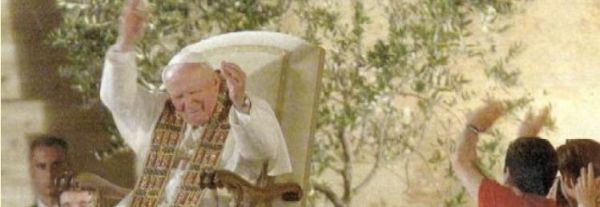"You are my beloved Son; in You I am well pleased".
2. The ceremony, which on this typical Sunday of the liturgical cycle we are about to perform, calls to our mind certain truths of essential importance in Christian doctrine.
First of all, it recalls the episode - read in today's Gospel - of the Baptism of Jesus, who wished to include himself, as a penitent, among the followers of John the Baptist in order to receive water baptism from him. Such a rite was a sign of penitence; but Jesus wanted to subject himself to it, to show openly that he accepted the religious message of the people of Israel, expressed in a conclusive way by the last of the Prophets. From Abraham to Moses, to Elijah, to Isaiah, through all the Prophets, up to John the Baptist, along the mysterious and dramatic "history of salvation" the "word of God" had walked with the Jewish people, until it led to the arcane voice from heaven that on Jesus, baptised by John, said: "You are my beloved Son; in you I am well pleased" (Lk 3:22). In Jesus, the Messiah awaited by the chosen people, the definitive transition from the Old to the New Testament took place, and John the Baptist was its austere and enlightened witness.
But today's Liturgy also and above all emphasises the value of the new Baptism, instituted by Jesus. John the Baptist, announcing the coming of the Messiah, said: 'One is coming who will baptise you in the Holy Spirit and fire'. Jesus, initiating the new 'economy' of salvation, tells the Apostles: 'All power in heaven and on earth has been given to me. Go and make disciples of all nations, baptising them in the name of the Father and of the Son and of the Holy Spirit" (Mt 28:18-19). This is the new and definitive Baptism, which eliminates from the soul the "original sin", inherent in human nature fallen through the rejection of love by the first two rational creatures, and restores to the soul the "sanctifying grace", that is, participation in the very life of the Holy Trinity. Every time Baptism is conferred, an amazing and marvellous event takes place; the rite is simple, but the meaning is sublime! The fire of God's creative and redeeming love burns and destroys sin and takes possession of the soul, which becomes the dwelling place of the Most High! The Evangelist St John affirms that Jesus has given us the power to become children of God, because from God we have been begotten (cf. Jn 1:12-13); and St Paul speaks repeatedly of our greatness and dignity as members of the Body of Christ (Col 2:19; Eph 3:11. 17. 19-22; 4:12).
3. Baptism is a supernatural gift, a radical transformation of human nature, the insertion of the soul into the very life of God, the concrete and personal realisation of the Redemption, and therefore consequently commits the baptised person to live in a new way, namely following Christ. It has never been easy to live as a Christian and even less so in modern society. The Church is happy to welcome these newly-baptised children; but she wants the parents, godparents and godmothers, and also the entire community, to take on the serious duties of good example, correct teaching and authentic Christian formation, so that the child in the gradual development of his or her existence may be faithful to his or her baptismal commitments.
4. St Augustine, recalling in the Confessions the episode of his Baptism, writes: 'In those days, all filled with extraordinary sweetness, I was not satisfied with considering the depth of your counsel for the salvation of the human race' (St Augustine, Confessiones, IX, ch. VI). This immense interior joy I also heartily wish for you and for your children, now and for ever, while I invoke the propitiatory intercession of Most Holy Mary, so that by her help the light and candour of Baptism, which these little ones now receive, may shine in them throughout their lives.
[Pope John Paul II, homily January 1983]
Dear Brothers and Sisters!
1. Today's liturgical feast of the Baptism of the Lord closes the Christmas season, which we observed this year with exceptional fervour and participation. Indeed, the Great Jubilee began on the Holy Night with the opening of the Holy Door in St Peter's.
This Christmas season has offered us a new occasion to recall the "fact" that occurred 20 centuries ago and definitively changed the course of history: Jesus' birth in Bethlehem.
In recalling Jesus' birth, we celebrated the great mystery of Redemption, to which we pay particular attention throughout the course of the Jubilee. The Son of God became man so that man could be raised to the dignity of God's adoptive son.
2. Today's feast of the Baptism of the Lord reminds us of this intimate union with the divine life.
[Pope John Paul II, Angelus 9 January 2000]












